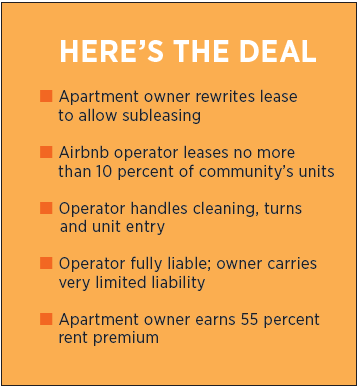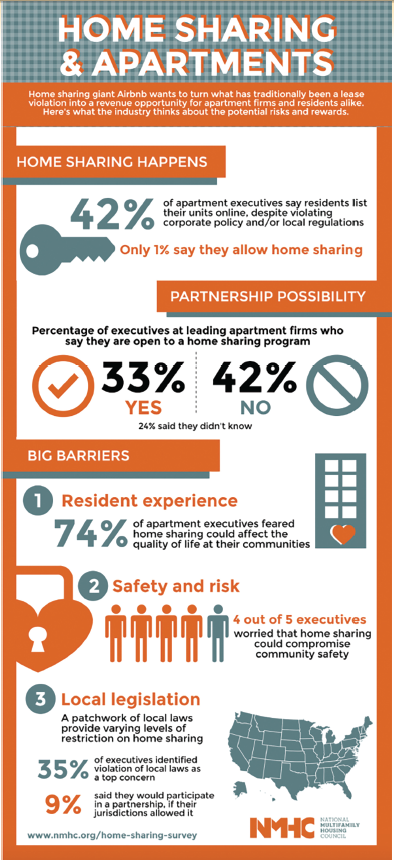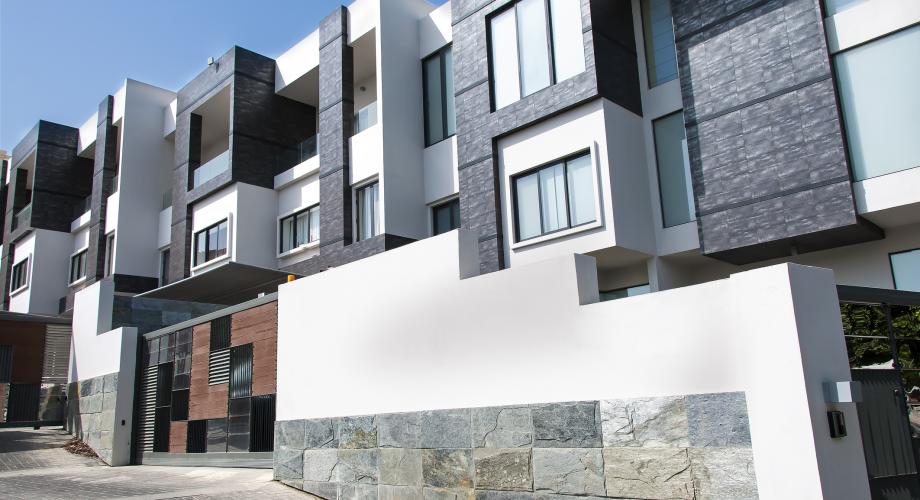Kansas City ‘A’ property is earning a 55 percent rent premium by dealing directly with resident.
A Class “A” community in the Kansas City metropolitan area has struck a deal with an Airbnb operator, allowing him to lease 10 percent of its apartments while charging him a hefty rent premium.
The operator signed a 12-month lease for the apartment homes at the “A” community with an agreement that after 90 days the apartment owner would decide if the operator could expand into other properties within their portfolio.
The company’s COO, who requested anonymity, says the arrangement has been successful and lucrative for both the property and the practitioner, indicating it is likely the operator will be allowed to expand into other properties in their portfolio when this 90-day trial period is completed in October.
As part of the agreement, the ownership group rewrote its lease to allow the operator to sub-let the apartments he is leasing, which are located near urban nightlife. This decision to allow subletting is a break from the typical stance that most apartment industry executives have expressed at industry conferences in regard to applying the Airbnb model for its own bottom-line benefit.
Many who have spoken recently during apartment industry conferences have pointed to concerns about resident screening and the risk of spoiling the resident experience that comes with its community’s culture. They add that they monitor Airbnb use by their residents who, by doing so, are violating their lease terms, which disallows both subleasing and “running a business” through their apartment homes. Management is then choosing to either warn or evict residents who are caught posting their units on Airbnb, a short-term rental website platform.
“We’ve had no complaints from our residents and no bad incidents,” the COO says. “He’s leased his units for one- to three-night stays, and has filled them for 80 percent to 85 percent of the month.”
The COO says the Airbnb operator expected to charge $130 to $170 per night for each of his units, which include one- and two-bedroom apartments. The community rents similar units to its full-time residents for between $1,200 and $1,600 per month.
“The operator came to us originally asking if he could lease more units in our community, and do the same at several of our other properties; he wanted a broader, exclusive agreement,” the COO says. “He offered to pay a 30 percent premium on rent. We charged him that, and then when you take into account the other additional charges he’s paying--such as higher costs for parking and access fees--we’re earning close to a 55 percent premium.”
We have language to our agreement with the practitioner that says if the local jurisdictions adjust how they enforce short-term rentals or the tax structure, our deal with him will be terminated with a 60-day notice.
Airbnb in September announced greater details about its much anticipated “Friendly Buildings” program (see “Airbnb Shares Details on New Home-Sharing Program”). However, this arrangement at the Kansas City community is not part of that program, the COO says. With Friendly Buildings, owners agree to allow residents to rent through Airbnb and they, along with Airbnb and the resident, each earn a percentage of the income, typically 3 percent to 6 percent.
“The way our arrangement works, we do not take on the additional risk that arrangement may trigger,” the COO says. “We are named as Additional Insured on his General Liability insurance policy and he has provided proof of additional coverages as well. He also has insurance through Airbnb (as would be any Airbnb host, according to Airbnb’s terms and conditions).”
The Kansas City area property also does not pay the costs to clean or to turn the operator’s apartments. The COO says that the operator budgets $500 per month, per apartment for a cleaning service. Additionally, the property’s staff does not participate with the “key” hand-off, instead utilizing a controlled-access system that allows codes for the apartment homes to be changed with little effort.
“If there had been any issues with this arrangement, our residents would have said something or expressed concern about these ‘guests’ who are entering and exiting the community, because it is highly visible activity,” the COO says.
“[The operator] really has done quite well for himself. He uses this same business model at approximately 100 units in other Kansas City apartment communities. He’s in his early 30s, and he wants to grow his short-term rental business. He is competing against at least one other larger base Airbnb operator in our market. From what we see, he provides very good customer service. He tells me that he thinks he’s undercharging for his units right now while he builds his reputation and increases his market presence. Eventually, he’ll raise his rents.
“It’s interesting to me that hotels near our community that offer comparable quality living arrangements and amenities sometimes list their hotel rooms at rates lower than what he is charging, but he’s still successful with his business. I think he caters to the type of person who wants to enjoy Kansas City’s nightlife and then go home to their own place and not have to live in a hotel-type culture.”
The COO says that Kansas City has a strong hotel lobby, adding that ultimately, through its objections, could disrupt this arrangement through regulations, etc., causing it not to work as well as it is.
“We have language to our agreement with the practitioner that says if the local jurisdictions adjust how they enforce short-term rentals or the tax structure, our deal with him will be terminated with a 60-day notice,” the COO says.
The COO adds, “Our owners have an entrepreneurial spirit, so they support others in business who possess that drive. They approved this arrangement, and hope it will be able to expand, as the premiums are higher than we would get in the normal market.”

Airbnb Probably Isn’t Driving Rents Up Much, At Least Not Yet
Are Airbnb rentals negatively affecting the overall apartment rental market in certain cities? That question has been debated since the origins of the company, with little public data to back up either side of the argument.
Now, the data-driven website FiveThirtyEight has found that while full-time, whole-unit listings—known as commercial listings—are currently a small percentage of total Airbnb listings, the company derives a disproportionate amount of its revenue from them. Therefore, the company has a financial incentive to increase these listings, which could eventually affect tight rental markets.
FiveThirtyEight analyzed data from Airdna, which the consulting firm scraped from Airbnb from June 2015 to May 2016, finding that Airbnb had almost 9,000 commercial listings in its 25 largest U.S. markets. Commercial listings account for 9.7 percent of the total listings in those markets, but almost a third of host revenue.
Mainland cities with commercial listings at higher than 10 percent include Portland, Ore. (15.6 percent) and Los Angeles (15.5 percent). Commercial listings accounted for 46.4 percent of host revenue in Los Angeles and 40.8 percent in Portland. Commercial listings made up at least 20 percent of host revenue in all of the site’s top 25 markets.
However, the raw number of commercial listings in each city is not currently a large percentage of overall rentals. For example, in Airbnb’s largest market, New York City, 2,500 listings are commercial, but the city has about 2.2 million rental units.
Just as the total number of listings on Airbnb has grown each year since 2009, so has the number of commercial listings.
Adopted from FiveThirtyEight, Aug. 24, 2016 post by Ariel Stulberg
[The operator] really has done quite well for himself. He uses this same business model at approximately 100 units in other Kansas City apartment communities.
Airbnb Shares Details on Its New Home-Sharing Program
Finally, a few details.
For more than a year, Airbnb has been working on a new program to bring together apartment communities, their owners and their residents into what they dub the “home-sharing world.” As first reported Sept. 12 on fortune.com, the Airbnb Friendly Building Program has launched.
It allows apartment building owners who sign up to work with Airbnb and their residents on allowing home-sharing on their properties to do so based on whatever rules the owners and residents find comfortable. The program includes a revenue share based on residents (or “guests”) they get through Airbnb.
Here’s how it works: “Apartment owners—provided they operate in a jurisdiction where short-term rental laws are clear, meaning that there’s no ambiguity nor potential for a regulatory mess—apply for the program,” reports Fortune.
“Once accepted, the owner decides the terms (which units, for how long, revenue division, etc.) under which [residents] can rent their homes and submits them to Airbnb, as well as amends its tenants’ leases. Eligible [residents] can then sign up for their building’s program through Airbnb, and become part of the regular reports the company sends to the landlord.”
Airbnb manages the payment reports to both the hosts and their owners, as well as collects and remits taxes where applicable, Fortune reports. According to Airbnb, building owners typical earn as much as 15 percent of their hosts’ earnings through the program.
The company began piloting this program in April, and to date, somewhere between 1,100 and 1,500 apartment homes are either participating or scheduled to soon join, according to Airbnb, as reported by Fortune.
Airbnb told Fortune that owners who are participating are located in San Jose, Calif., Philadelphia, and Nashville, among other locations. Fortune says that participating communities vary from smaller, “mom and pop”-owned properties to companies that operate 50,000 units.
Airbnb tells Fortune exclusively that “its reports will include financial transactions from hosts who haven’t agreed to be part of the building’s official home-sharing program, but will not disclose specifics about those hosts, including their names and exact apartment unit,” Fortune writes.
Fortune reports that Airbnb has made it clear that it intends the program to be for owners or management companies with long-term residents—not simply those who wish to operate short-term rental-only units. Airbnb is also restricting the program to market-rate units, at least for now, Fortune reports.

Survey: One-Third of Leading Apt Firms Open to Home Sharing
Forty-three percent of leaders from the nation’s largest apartment firms indicated their residents listed homes on short-term rental sites, according to a new survey released in September from the National Multifamily Housing Council (NMHC).
The survey on home sharing follows a recent Airbnb announcement on its multifamily partnership program, which represents the first market-driven attempt to turn what is currently a lease violation into a revenue opportunity for both apartment firms and their residents – so long as the home sharing company can address the concerns held by multifamily owners and operators.
The survey, fielded Sept. 7-12, includes responses from 79 firm leaders, covering a third of the NMHC 50 largest apartment owners and managers and more than one million apartment homes. One-third (33 percent) are open to a partnership program similar to what Airbnb has announced, and another 42 percent said they weren’t interested; the remainder responding that they did not know.
According to the survey, the top problems stemming from residents listing their apartment on home sharing platforms were safety issues (80 percent), liability and insurance (74 percent) and quality of life concerns/ neighborhood dynamic (74 percent).
Airbnb’s multifamily partnership program, first presented at the 2015 NMHC OPTECH Conference, attempts to alleviate these concerns while also offering a revenue share, along with better information and management of the listings.
Another issue facing the use of home sharing is the patchwork of local laws that provide varying levels of restriction. Of those interested in participating in a home-sharing program, a quarter of those (9 percent of all responses) would consider home-sharing if their jurisdiction allowed it. Moreover, 35 percent identified violation of local laws as a top concern with their residents listing their apartment homes on home sharing platforms.
The survey also asked about how apartment firms respond to residents violating their leases by using home sharing platforms. Almost four in ten (39 percent) reported taking action for lease violations. Among those taking action, the most common enforcements were verbal/written warnings (86 percent) and lease termination (54 percent).
Visit www.nmhc.org/home-sharing-survey for more.
